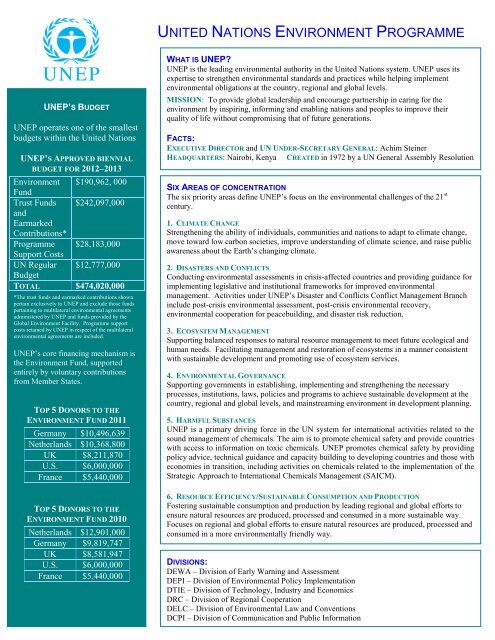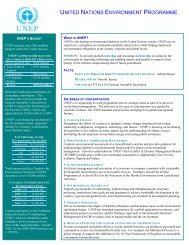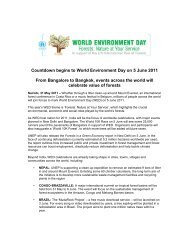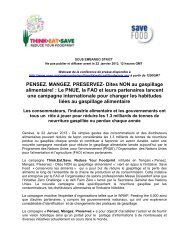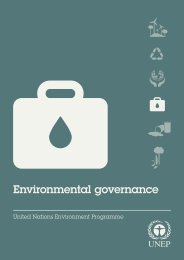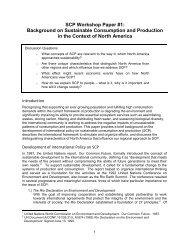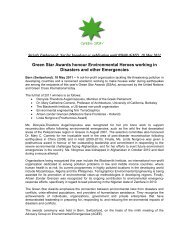General - Regional Office of North America - UNEP
General - Regional Office of North America - UNEP
General - Regional Office of North America - UNEP
You also want an ePaper? Increase the reach of your titles
YUMPU automatically turns print PDFs into web optimized ePapers that Google loves.
UNITED NATIONS ENVIRONMENT PROGRAMME<br />
<strong>UNEP</strong>’S BUDGET<br />
<strong>UNEP</strong> operates one <strong>of</strong> the smallest<br />
budgets within the United Nations<br />
<strong>UNEP</strong>’S APPROVED BIENNIAL<br />
BUDGET FOR 2012–2013<br />
Environment $190,962, 000<br />
Fund<br />
Trust Funds $242,097,000<br />
and<br />
Earmarked<br />
Contributions*<br />
Programme $28,183,000<br />
Support Costs<br />
UN Regular $12,777,000<br />
Budget<br />
TOTAL $474,020,000<br />
*The trust funds and earmarked contributions shown<br />
pertain exclusively to <strong>UNEP</strong> and exclude those funds<br />
pertaining to multilateral environmental agreements<br />
administered by <strong>UNEP</strong> and funds provided by the<br />
Global Environment Facility. Programme support<br />
costs retained by <strong>UNEP</strong> in respect <strong>of</strong> the multilateral<br />
environmental agreements are included.<br />
<strong>UNEP</strong>’s core financing mechanism is<br />
the Environment Fund, supported<br />
entirely by voluntary contributions<br />
from Member States.<br />
TOP 5 DONORS TO THE<br />
ENVIRONMENT FUND 2011<br />
Germany $10,496,639<br />
Netherlands $10,368,800<br />
UK $8,211,870<br />
U.S. $6,000,000<br />
France $5,440,000<br />
TOP 5 DONORS TO THE<br />
ENVIRONMENT FUND 2010<br />
Netherlands $12,901,000<br />
Germany $9,819,747<br />
UK $8,581,947<br />
U.S. $6,000,000<br />
France $5,440,000<br />
WHAT IS <strong>UNEP</strong>?<br />
<strong>UNEP</strong> is the leading environmental authority in the United Nations system. <strong>UNEP</strong> uses its<br />
expertise to strengthen environmental standards and practices while helping implement<br />
environmental obligations at the country, regional and global levels.<br />
MISSION: To provide global leadership and encourage partnership in caring for the<br />
environment by inspiring, informing and enabling nations and peoples to improve their<br />
quality <strong>of</strong> life without compromising that <strong>of</strong> future generations.<br />
FACTS:<br />
EXECUTIVE DIRECTOR and UN UNDER-SECRETARY GENERAL: Achim Steiner<br />
HEADQUARTERS: Nairobi, Kenya CREATED in 1972 by a UN <strong>General</strong> Assembly Resolution<br />
SIX AREAS OF CONCENTRATION<br />
The six priority areas define <strong>UNEP</strong>’s focus on the environmental challenges <strong>of</strong> the 21 st<br />
century.<br />
1. CLIMATE CHANGE<br />
Strengthening the ability <strong>of</strong> individuals, communities and nations to adapt to climate change,<br />
move toward low carbon societies, improve understanding <strong>of</strong> climate science, and raise public<br />
awareness about the Earth’s changing climate.<br />
2. DISASTERS AND CONFLICTS<br />
Conducting environmental assessments in crisis-affected countries and providing guidance for<br />
implementing legislative and institutional frameworks for improved environmental<br />
management. Activities under <strong>UNEP</strong>’s Disaster and Conflicts Conflict Management Branch<br />
include post-crisis environmental assessment, post-crisis environmental recovery,<br />
environmental cooperation for peacebuilding, and disaster risk reduction.<br />
3. ECOSYSTEM MANAGEMENT<br />
Supporting balanced responses to natural resource management to meet future ecological and<br />
human needs. Facilitating management and restoration <strong>of</strong> ecosystems in a manner consistent<br />
with sustainable development and promoting use <strong>of</strong> ecosystem services.<br />
4. ENVIRONMENTAL GOVERNANCE<br />
Supporting governments in establishing, implementing and strengthening the necessary<br />
processes, institutions, laws, policies and programs to achieve sustainable development at the<br />
country, regional and global levels, and mainstreaming environment in development planning.<br />
5. HARMFUL SUBSTANCES<br />
<strong>UNEP</strong> is a primary driving force in the UN system for international activities related to the<br />
sound management <strong>of</strong> chemicals. The aim is to promote chemical safety and provide countries<br />
with access to information on toxic chemicals. <strong>UNEP</strong> promotes chemical safety by providing<br />
policy advice, technical guidance and capacity building to developing countries and those with<br />
economies in transition, including activities on chemicals related to the implementation <strong>of</strong> the<br />
Strategic Approach to International Chemicals Management (SAICM).<br />
6. RESOURCE EFFICIENCY/SUSTAINABLE CONSUMPTION AND PRODUCTION<br />
Fostering sustainable consumption and production by leading regional and global efforts to<br />
ensure natural resources are produced, processed and consumed in a more sustainable way.<br />
Focuses on regional and global efforts to ensure natural resources are produced, processed and<br />
consumed in a more environmentally friendly way.<br />
DIVISIONS:<br />
DEWA – Division <strong>of</strong> Early Warning and Assessment<br />
DEPI – Division <strong>of</strong> Environmental Policy Implementation<br />
DTIE – Division <strong>of</strong> Technology, Industry and Economics<br />
DRC – Division <strong>of</strong> <strong>Regional</strong> Cooperation<br />
DELC – Division <strong>of</strong> Environmental Law and Conventions<br />
DCPI – Division <strong>of</strong> Communication and Public Information
<strong>UNEP</strong> MILESTONES<br />
1972: <strong>UNEP</strong> established after UN<br />
Conference on the Human Environment<br />
1973: Convention on the International<br />
Trade in Endangered Species <strong>of</strong> Wild<br />
Fauna and Flora (CITES)<br />
1979: Bonn Convention on Migratory<br />
Species (CMS)<br />
1985: Vienna Convention for the<br />
Protection <strong>of</strong> the Ozone Layer<br />
1987: Montreal Protocol on Substances<br />
that Deplete the Ozone Layer<br />
1989: Basel Convention on the<br />
Transboundary Movement <strong>of</strong> Hazardous<br />
Waste<br />
1992: Convention on Biological Diversity<br />
(CBD)<br />
1995: Global Programme <strong>of</strong> Action (GPA)<br />
launched to protect marine environment<br />
from land-based sources <strong>of</strong> pollution<br />
1998: Rotterdam Convention on Prior<br />
Informed Consent<br />
2000: Cartagena Protocol on Biosafety<br />
adopted to address issue <strong>of</strong> genetically<br />
modified organisms<br />
2000: Malmö Declaration- a call for action<br />
by the first Global Ministerial<br />
Environment Forum<br />
2001: Stockholm Convention on Persistent<br />
Organic Pollutants (POPs)<br />
2002: World Summit on Sustainable<br />
Development reaffirmed <strong>UNEP</strong>’s central<br />
role in international efforts to achieve<br />
sustainable development<br />
2005: Bali Strategic Plan for Technology<br />
Support and Capacity Building adopted by<br />
<strong>UNEP</strong> Governing Council<br />
2005: World Summit on Sustainable<br />
Development emphasized key role <strong>of</strong><br />
environment in sustainable development<br />
2009: <strong>UNEP</strong> Governing Council agreed to<br />
launch negotiations on an international<br />
mercury treaty<br />
2010: The Nagoya Protocol on Access to<br />
Genetic Resources and the Fair and<br />
Equitable Sharing <strong>of</strong> Benefits<br />
2011: Green Economy Report launched<br />
2012: Intergovernmental Platform on<br />
Biodiversity and Ecosystems Services<br />
(IPBES) established<br />
2012: UN Conference on Sustainable<br />
Development (Rio+20)<br />
•<br />
The Role <strong>of</strong> Science<br />
<strong>UNEP</strong> has a mandate to monitor the global environment and relay scientific information to<br />
governments and other stakeholders.<br />
<strong>UNEP</strong> is a co-founder <strong>of</strong> the Intergovernmental Panel on Climate Change (IPCC)<br />
<strong>UNEP</strong>’s Major Publications:<br />
One Planet, Many People: Atlas <strong>of</strong> Our Changing Environment (2005)<br />
World Atlas <strong>of</strong> Great Apes and their Conservation (2005)<br />
Planet in Peril: Atlas <strong>of</strong> Current Threats to People and the Environment (2006)<br />
Africa's lakes: Atlas <strong>of</strong> Our Changing Environment (2006)<br />
Global Environment Outlook: environment for development (GEO-4) (2007)<br />
Africa: Atlas <strong>of</strong> Our Changing Environment (2008)<br />
Carbon and biodiversity: A demonstration Atlas (2008)<br />
FreshWater under Threat: South Asia (2009)<br />
The Uganda Atlas - Evidence <strong>of</strong> Uganda's Changing Environment (2009)<br />
Kenya Atlas <strong>of</strong> Our Changing Environment (2009)<br />
The Latin <strong>America</strong> and the Caribbean Atlas <strong>of</strong> our Changing Environment (2010)<br />
Africa Water Atlas (2010)<br />
Near-term Climate Protection and Clean Air Benefits: Actions for Controlling Short-Lived Climate<br />
Forcers - A <strong>UNEP</strong> Synthesis Report (2011)<br />
Women at the Frontline <strong>of</strong> Climate Change - Gender Risks and Hopes (2011)<br />
Bridging the Emissions Gap: A <strong>UNEP</strong> Synthesis Report (2011)<br />
Livelihood Security: Climate Change, Conflict and Migration in the Sahel (2011)<br />
Global Environment Outlook: Keeping Track <strong>of</strong> Our Changing Environment (GEO-5) (2012)<br />
MULTILATERAL ENVIRONMENTAL AGREEMENTS & VOLUNTARY PARTNERSHIPS<br />
<strong>UNEP</strong> supports the development <strong>of</strong> solutions to environmental challenges, including voluntary<br />
initiatives and legally-binding instruments, and is an implementing agency <strong>of</strong> the Global<br />
Environment Facility. <strong>UNEP</strong> serves as the Secretariat for:<br />
The Convention on Biological Diversity<br />
The Convention on International Trade in Endangered Species<br />
The Convention on Migratory Species<br />
The Montreal Protocol on Substances that Deplete the Ozone Layer<br />
The Basel Convention on Hazardous Wastes<br />
The Rotterdam Convention on Prior Informed Consent<br />
The Stockholm Convention on Persistent Organic Pollutants<br />
Numerous <strong>Regional</strong> Seas Conventions and Protocols<br />
SIX REGIONAL OFFICES<br />
<strong>UNEP</strong>'s Division <strong>of</strong> <strong>Regional</strong> Cooperation (DRC) works to ensure that <strong>UNEP</strong>’s activities<br />
address regional needs and priorities. DRC also works to enhance cooperation among<br />
governments in each region in addressing environmental issues strategically and effectively.<br />
<strong>UNEP</strong> has six regional <strong>of</strong>fices:<br />
Africa: Nairobi, Kenya<br />
Asia and the Pacific: Bangkok, Thailand<br />
Latin <strong>America</strong> & the Caribbean: Panama City, Panama<br />
<strong>North</strong> <strong>America</strong>: Washington, D.C.<br />
West Asia: Manama, Bahrain<br />
Europe: Geneva, Switzerland<br />
REGIONAL OFFICE FOR NORTH AMERICA (RONA)<br />
<strong>UNEP</strong>'s <strong>North</strong> <strong>America</strong>n region comprises Canada and the United States <strong>of</strong> <strong>America</strong>.<br />
RONA’s mission is to build support in the region for <strong>UNEP</strong>'s work, to promote effective<br />
responses to international environmental challenges and to foster cooperation on<br />
environmental issues between <strong>North</strong> <strong>America</strong> and the broader international community. To<br />
achieve this mission, RONA’s strategy is to promote collaboration between <strong>UNEP</strong> and all<br />
sectors <strong>of</strong> <strong>North</strong> <strong>America</strong>n society, including U.S. and Canadian governmental institutions, the<br />
private sector and civil society groups, and to provide <strong>UNEP</strong> with <strong>North</strong> <strong>America</strong>n<br />
perspectives.<br />
CONTACT<br />
<strong>UNEP</strong> <strong>Regional</strong> <strong>Office</strong> for <strong>North</strong> <strong>America</strong><br />
900 17 th Street, NW Suite 506, Washington, DC 20006 USA<br />
Telephone: +1 202 785 0465 Fax: +1 202 785 2096<br />
E-mail: info.rona@unep.org www.unep.org/rona www.unep.org


